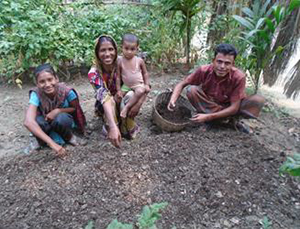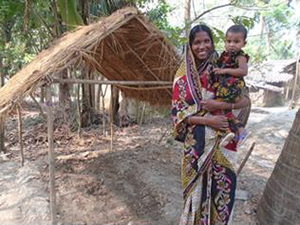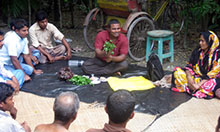How Compost Boosts Family Gardens in Bangladesh

"I do not have to go to the bazaar to buy vegetables any more, as I can grow them in my backyard," says 31-year-old Nasima Begum, a graduate of the local farmer nutrition school (FNS) in Jessore Sadar upazila. The USAID-funded Strengthening Partnerships, Results, and Innovations in Nutrition Globally (SPRING) project has implemented over 6,000 FNS in Barisal and Khulna Divisions. "For years we tried but failed to cultivate on sandy soil because I did not know that compost can make this soil suitable, nor how to make compost. Learning this has made my life easier," Nasima explained.
Decayed organic matter, compost is made by gathering plant material—such as leaves, grass clippings, and vegetable peels—into a pile and letting bacteria, fungi, and other organisms cause it to rot. Nasima learned that compost helps keep the soil in good condition, retaining water and nutrients and warding off plant diseases. It also produces more nutritious crops.
The creation and use of compost is just one of the many agricultural techniques taught to FNS students in Barisal and Khulna Divisions. The schools provide lessons and hands-on training in homestead food production and convey nutrition and hygiene messages to pregnant and lactating women.

Learning (how to make compost) has made my life easier.
—Nasima Begum, farmer nutrition school graduate
Nasima was an enthusiastic and attentive student. Within three months of enrollment in the FNS and with the support of her husband, she produced enough compost to grow vegetables in her backyard. Because of this success, when Nasima graduated from the FNS, she was chosen by her peers to be the community nutrition champion (CNC) for her village. A CNC promotes essential nutrition and hygiene actions and encourages FNS participants and other interested community members to continue using their new farming skills.
Nasima's compost-making and vegetable-growing prowess caught the community's attention. Her neighbors and relatives came to her to learn about better nutrition through compost making and vegetable gardening. By learning and applying this simple technique, Nasima transformed not just her own backyard but also those of her neighbors. A leader among her peers, she is also newly empowered in her own home, where she decides not only what is on her family's menu, but also helps to grow it.
Photo credits: SPRING/Bangladesh
More than 126,000 women have benefited from 6,421 SPRING-implemented farmer nutrition schools across 40 upazilas in Barisal and Khulna since May 2012. SPRING/Bangladesh facilitates social and behavior change to prevent stunting in young children by focusing on nutrition during the critical "1,000 days" from pregnancy through the first two years of life.
